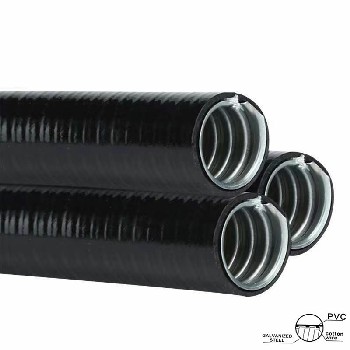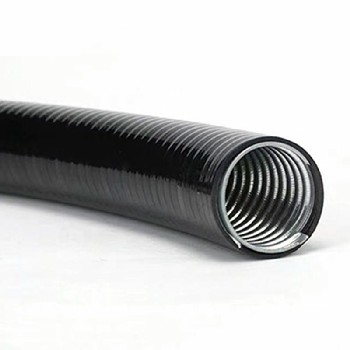We are specialized in manufacturing all kinds of metal conduit,
Hangzhou Fanyumeier Trading Co., Ltd
Application and installation of flexable conduit
Overview of Flexible Conduit
Flexible conduit, also known as flexible electrical conduit or flex conduit, is a versatile solution used to protect and route electrical wires and cables. It is designed to provide flexibility and durability while ensuring the safety of electrical installations. Flexible conduit consists of a series of interconnected tubes or channels that encase the wires or cables, shielding them from moisture, abrasion, and other external elements.
Types of Flexible Conduit
Metallic Flexible Conduit
Metallic flexible conduit is made of metal materials such as galvanized steel or aluminum. It offers excellent strength and durability, making it suitable for demanding environments. Metallic conduits are available in various types, including flexible metal conduit (FMC) and armored cable (AC). These conduits provide reliable protection against physical damage and electromagnetic interference.
Non-Metallic Flexible Conduit
Non-metallic flexible conduit is typically made of PVC (polyvinyl chloride) or other thermoplastic materials. It offers flexibility while providing adequate protection to the enclosed wires or cables. Non-metallic conduits are lightweight, corrosion-resistant, and easy to install. They are commonly used in residential and light commercial applications.

Advantages of Flexible Conduit
Flexibility: The primary advantage of flexible conduit is its ability to bend and adjust to various angles and positions, allowing for easy installation in complex wiring scenarios.
Protection: Flexible conduit provides a protective layer around electrical cables, safeguarding them from moisture, chemicals, abrasion, and other external factors. This protection ensures the longevity and reliability of the electrical system.
Routing and Organization: By using flexible conduit, cables can be neatly routed and organized, preventing tangling and confusion. This not only enhances the aesthetics of the installation but also simplifies maintenance and troubleshooting.
Reduced Electromagnetic Interference: Metallic flexible conduit can effectively reduce electromagnetic interference (EMI) caused by nearby power sources or electronic equipment. This is particularly important in sensitive applications that require minimal interference.
Applications of Flexible Conduit
Residential Applications
Home Wiring: Flexible conduit is commonly used in residential electrical installations to protect wires and cables running through walls, floors, or ceilings.
Outdoor Lighting: It is ideal for routing and protecting electrical cables used in outdoor lighting systems, such as garden lights and pathway illumination.
Commercial Applications
Industrial Facilities: Flexible conduit is extensively used in industrial environments to protect electrical cables in areas with high temperatures, chemicals, or physical hazards.
Data Centers: In data centers, where cable management and organization are critical, flexible conduit plays a vital role in routing and protecting network cables.
Selecting the Right Flexible Conduit
When choosing a flexible conduit for your specific application, consider factors such as:
Material: Determine whether a metallic or non-metallic conduit is more suitable for your needs, based on the environment, level of protection required, and applicable regulations.
Size: Select a conduit with the appropriate diameter to accommodate the number and size of the cables that will pass through it.
Connectivity: Ensure that the conduit you choose is compatible with the connectors and fittings required for your installation.

Installation Process
Preparing for Installation
Before installing flexible conduit, it is essential to plan the routing path, identify the entry and exit points, and calculate the required length. Ensure you have the necessary tools and equipment, including conduit cutters, connectors, and fasteners.
Mounting the Conduit
Start by mounting the conduit brackets or clamps at regular intervals along the planned route. Ensure they are securely fastened to the surface using appropriate screws or anchors.
Securing and Routing the Cables
Insert the cables into the conduit, ensuring they are adequately secured and supported at regular intervals. Avoid overfilling the conduit to maintain proper flexibility.
Connecting the Conduit
Use appropriate connectors, couplings, or fittings to join sections of conduit together. Ensure tight and secure connections to maintain the integrity of the installation.
Maintenance and Care
Flexible conduit requires minimal maintenance. However, it is essential to periodically inspect the conduit for any signs of damage, such as cracks, kinks, or loose fittings. Promptly replace any damaged sections to ensure continuous protection and performance.
where to buy flexable conduit
HANGZHOU LOVEHOME INDUSTRIAL CO.,LTD is a company who borns in Hangzhou -- the beautiful G20 Summit host city in 2016. Our products are also mainly exported to Southeast Asian countries, such as Singapore, Malaysia, Philippines, Indonesia, etc., as well as Dubai in the Middle East. We have our own factory -- Hangzhou Xiaoshan Guali Metal Flex. Conduit Factory. It is a large-sized privately owned enterprise which was established in 1997. We are specialized in manufacturing all kinds of metal conduit, G.I steel strip and connectors.
-
Seal Tight Conduit: Protecting Your Electrical Wiring with Confidence

2023-07-10
-
6-Inch Plastic Pipe - Versatile and Durable Solution for Various Applications

2023-07-10
-
Understanding the benefits and drawbacks of plastic drain pipes

2023-07-10
-
What Is Flexible Non-Metallic Conduit and Where Is It Used

2023-07-10
















